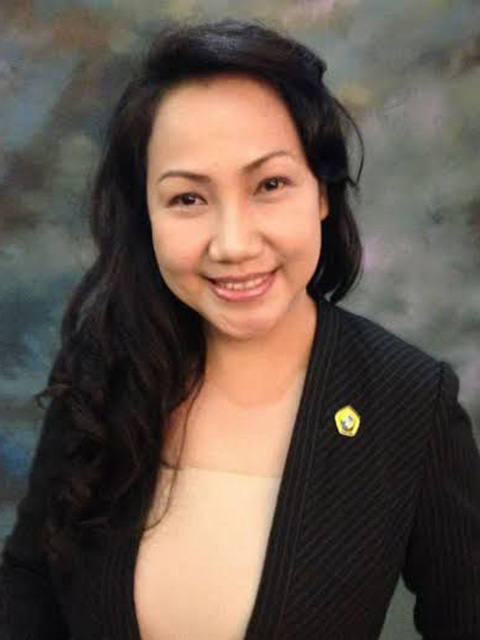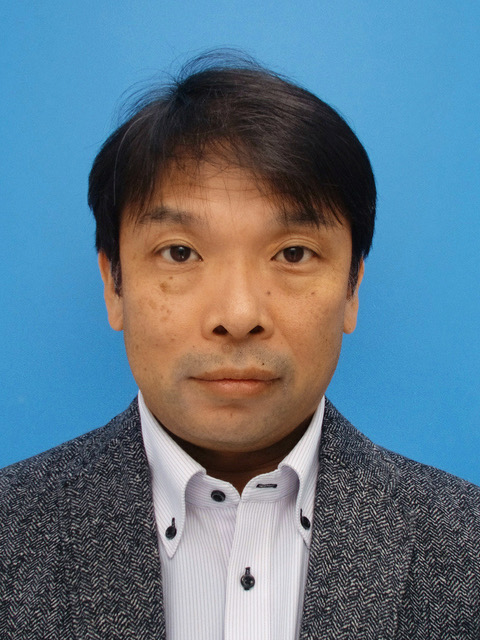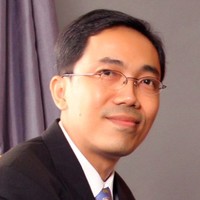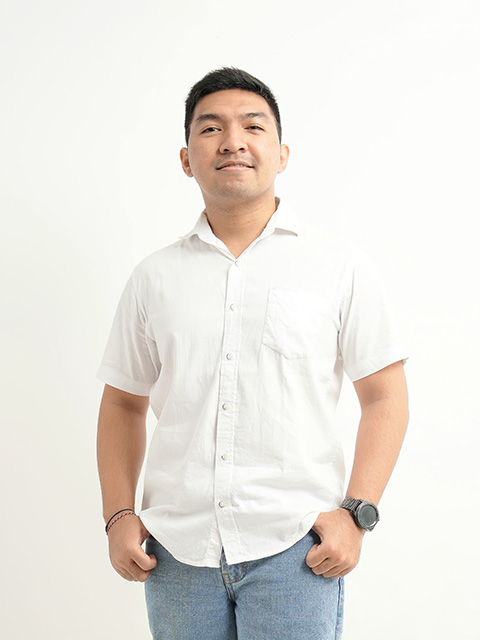Program at a Glance
December 5 (Thu)
| Welcome Coffee and Snacks |
| Welcome Reception |
| Keynote 1 |
| Lunch (Complementary) |
| Keynote 2 |
| Invited Talk 1 |
| Invited Talk 2 |
| Conference Reception (Complementary) |
December 6 (Fri)
| Morning Coffee and Snacks |
| Panel Discussion / Forum Discussion |
| Lunch (Complementary) |
| Keynote 3 |
| Technical Session |
| Conference Banquet (Complementary) |
December 7 (Sat)
| Morning Coffee and Snacks |
| Technical Session |
| Lunch (Complementary) & Conference Adjournment |
Keynote Speakers
Keynote 1

Dr. Lidia Sandra
Vice Rector Bali Dwipa University, Bali, DCS Alumni
- Title
- The Gravity of Social Interactions: Understanding Personality Shifts via Temporal Graphs and Deep Learning
- Abstract
- This research introduces a ground breaking temporal graph-based deep learning model that traces the evolution of personality dynamics across social networks. By envisioning interactions as gravitational forces, the model explores how social connections pull and reshape individual personality traits over time. Using BERT for nuanced personality prediction and temporal graphs for dynamic mapping, this study captures how varying intensities of social engagement drive fluctuations in personality traits. Findings reveal that frequent, deep connections within the network lead to noticeable co-occurrences of personality characteristics, suggesting that social interaction intensity functions similarly to gravitational force in influencing behavioural alignment. This work bridges computer science and psychology, offering a new lens on personality prediction, social media analysis, and implications for real-world applications in mental health, recommendation systems, and behavioural insights. Through an interdisciplinary approach, this research provides innovative tools for observing human personality in dynamic social environments, with a focus on temporal and gravitational patterns.
Keynote 2

Prof. Takuichi Nishimura
Japan Advanced Institute of Science and Technology, Japan
- Title
- Beyond Tacit Knowledge: Uncovering the True Essence of Expert Excellence
- Abstract
-
What do experts know, how do they think, and why can they achieve exceptional
results?
Our research team has thoroughly analyzed the thinking patterns and behaviors of experts operating at the forefront of diverse fields, including nursing care, music education, classroom teaching, product design, customer service, sports instruction, psychotherapy, childcare, and innovation. Our findings reveal that their excellence extends far beyond mere "knowledge" or "experience."
While tacit knowledge? difficult to verbalize? forms a crucial foundation for experts, true masters possess additional qualities:
- Intuitive ability to instantly read and flexibly respond to situations
- Communication skills that build deep trust with stakeholders
- Mental fortitude and passion to tackle challenges
- Aspirations to reach greater heights
These qualities reflect a profound depth of human character.
In this talk, we will introduce methods for structuring tacit knowledge extracted from experts across various fields, while also exploring the "human excellence" that lies beyond. Furthermore, we will investigate new possibilities for passing on this valuable wisdom to future generations.
Keynote 3

Prof. Tessai Hayama
Nagaoka University of Technology, Japan
- Title
- Advances in Human Activity Recognition: Intelligent Systems and Real-World Applications
- Abstract
- Human Activity Recognition (HAR) has emerged as a central component of intelligent systems, driving innovation in fields such as smart cities, human-computer interaction, and healthcare. This talk will provide a detailed overview of the fundamental technologies behind HAR, including sensor data processing, machine learning models, and context-aware systems. Additionally, it will present our latest research, which enhances the accuracy and adaptability of HAR systems through the integration of knowledge engineering and big data analytics.
Invited Speakers
Invited Talk 1

Benny K. Yudiaatmaja
FRM Risk Advisor at Indonesia Eximbank, DCS Student
- Title
- Synergizing Finance and Technology: Machine Learning, Blockchain, and Risk Management in Banking
- Abstract
- The synergy between the technology, especially machine learning and blockchain tech, with the banking industry is examined in this session. We are going to explore how these technologies are digitizing banking operations, by empowering better efficiency, security and customer experience. We also investigate the opposite flow of lessons, in that it considers how insights from banking may be used to enhance software engineering practice. This include credit scoring, fraud detection, anomaly detection, blockchain applications, anti-money laundering (AML), algorithmic trading or stress tests as well as liquidity risk assessment. This, also brings in a novel cross-disciplinary methodology where banking models drive the evolution of software engineering risk-assessment frameworks using Software Reliability Economic Value-at-Risk (SREVaR) which adapts the VaR methodology from finance including banking; The integration of these disciplines has become a new horizon for both finance and technology.
Invited Talk 2

Gede Indra Raditya Martha
CEO - PT. Stargazer Teknologi Indonesia, DCS Student
- Title
- Paradigm Shift - Virtual Commodities in the Virtual World
- Abstract
-
The gaming industry has reached an impressive growth milestone, with a global market
value of USD 347.7 billion in 2023, showing a year-over-year growth of 8.4% and
projected to reach USD 395 billion by 2025. This achievement surpasses the combined
multimedia industries like music and film, supported by a global user base of 3.38
billion people, equivalent to 42.4% of the world's population. This phenomenon reflects
a significant transformation in how humans interact with the digital world, where
virtual spaces like online games and metaverse have become an integral part of everyday
life.
This market share represents the direct native users of future virtual worlds, comprising video game players and virtual space users with utilities beyond gaming, such as the metaverse. The shift in behavior and living culture in digital spaces is indirectly proven by the average gameplay time of over 20 hours per week for online game players like MMORPG, who can log into their games repeatedly.
As time progresses, virtual worlds in any form will become a normal life experience for many people. This is further reinforced by the maturing of younger generations like Millennials Z and Alpha, who are digital natives and value virtual worlds far more than previous generations. Moving forward, this will make everything within the virtual world increasingly valuable.
Virtual goods or digital items will become commonly traded commodities that can generate significant economic value as a source of income. Currently, especially for older generations, if asked to choose between:
Most would likely choose the 2-carat VVS1 diamond. However, when compared, the Ethereal Flames Pink War Dog virtual item not only has a similar price but is also easier and faster to sell, even within minutes. Both provide social status through ownership. As an investment, the initial price of the Ethereal Flames Pink War Dog was only USD 1,000 (2012), resulting in a 308% annual return over 12 years. In contrast, a 2-carat diamond in 2012 was priced at USD 32,000, yielding only a 2.08% annual return. There are many more advantages and potential aspects of such virtual items that could be discussed in detail.
Imagine the future of virtual worlds becoming increasingly massive, with use cases ranging from entertainment and gaming to work. These virtual items will become even more valuable. Creators of these worlds, such as online game developers, metaverse creators, and supporting components like 3D designers, programmers, and virtual business utility designers, will become new sources of profit and employment at a time when many jobs are being lost due to AI and automation.
However, to achieve this, we need to resolve many technological challenges. Practitioners and researchers are crucial in preparing the infrastructure, technology, and regulations. This includes fundamental research like network optimization for better internet, hardware research for processing (like GPUs), sensing technologies (like in the VR, Immersive Heptics etc), and other human body sensory technologies. We need more efficient game engines and mechanisms to eliminate minimum specification limitations for end-users. There are many things that need to be done to enhance the use of the virtual world that is more closely related to human life in the future.